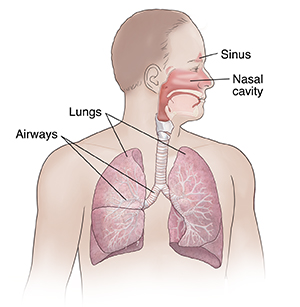Adult CF: The Respiratory System
Cystic fibrosis (CF) is an inherited disease. It causes problems in the cells of the body that make salt, water, and mucus. There is no cure for CF. Some people with advanced CF may be considered for lung transplant. But this doesn't cure CF or stop it from effecting other parts of the body.
Improved treatments can help people with CF live longer and healthier lives. Many people with CF live past age 30. Life expectancy is improving with continued development of new treatments.
CF is caused by a change (mutation) in the CFTR gene. CFTR stands for cystic fibrosis transmembrane conductance regulator. This mutation causes a problem in the CFTR protein. This protein controls the flow of water and salt in and out of the body's cells. If you have CF, this protein doesn’t work right. So, mucus and other secretions become thickened and sticky.
CF first affects the small airways in the lungs. Over time, it can affect all airways. You may develop lung infections. This is because bacteria that are normally cleared from the lungs remain in the thickened mucus. Many of these lung infections are long-term (chronic).
You can also have problems in your upper respiratory tract. You can develop nasal polyps. These are small growths of tissue from the lining of the nose that extend into the nasal cavity. Sometimes these polyps must be taken out by a healthcare provider. You may also have sinus infections.

CF’s effects on the respiratory system can cause these symptoms:
- Chronic cough
- Coughing up blood
- Collapsed lung
- A rounding and enlargement of the fingers and toes (clubbing)
- Frequent lung infections with thick phlegm
- Heart enlargement
- Nasal polyps
- Shortness of breath
- Fever
- Loss of appetite
- Weight loss
- Wheezing
- Inflamed nasal sinuses (sinusitis)